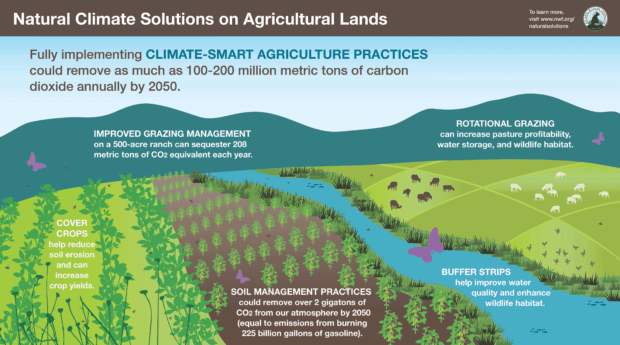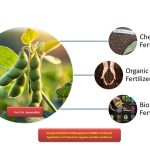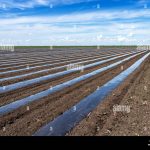Imagine a world where you can enjoy your favorite foods without worrying about their impact on the planet. This isn’t just a dream—it’s becoming a reality thanks to smart farming.
As climate change continues to challenge our environment, smart farming emerges as a powerful ally in the fight. But how exactly does it work, and what does it mean for you? You’ll uncover the groundbreaking ways smart farming is revolutionizing agriculture, reducing carbon footprints, and securing a sustainable future for all.
Keep reading to discover how embracing these innovations can make a difference in your life and the world around you.

Precision Agriculture
Precision Agriculture is transforming farming practices, reducing environmental impact. This approach uses technology to increase efficiency and sustainability. Farmers can make informed decisions using data and analytics. This minimizes resource use and boosts crop yields.
Understanding Precision Agriculture
Precision Agriculture involves collecting detailed data about fields. It uses sensors, GPS, and drones. These tools monitor soil conditions and crop health. Farmers analyze this data to optimize their farming techniques. This leads to better resource management and reduced waste.
Reducing Chemical Use
Farmers can target specific areas with fertilizers and pesticides. This approach limits chemical spread. It helps protect the environment and reduces harmful runoff. Precision Agriculture ensures chemicals are used only where needed.
Efficient Water Management
Water is a vital resource in farming. Precision Agriculture helps monitor soil moisture levels. Farmers can adjust irrigation systems based on real-time data. This conserves water and prevents over-irrigation. It leads to healthier crops and reduced water waste.
Improving Crop Yields
Precision Agriculture allows farmers to understand crop needs. By analyzing data, farmers can adjust planting strategies. This results in healthier plants and higher yields. Farmers can grow more food using fewer resources.
Adapting To Climate Conditions
Climate change affects farming conditions worldwide. Precision Agriculture provides valuable insights. Farmers can adapt practices to changing weather patterns. This helps maintain crop health despite environmental challenges.
Resource Efficiency
Resource efficiency is vital in the fight against climate change. Smart farming uses technology to make farms more efficient. It reduces waste and saves resources. This approach helps protect the environment and supports sustainable agriculture. By using resources wisely, farmers can lessen their impact on the planet.
Water Conservation
Smart farming uses sensors to monitor soil moisture. This means farmers water crops only when needed. It saves water and helps crops grow better. Less water use means less stress on local water sources. This conservation is crucial for dry regions.
Energy Savings
Smart farms use renewable energy like solar panels. These farms use less fossil fuel. This reduces greenhouse gas emissions. Automated systems help manage energy use efficiently. This results in lower energy costs and a smaller carbon footprint.
Precision Fertilization
Precision farming uses data to apply fertilizers accurately. This means using only the necessary amount. It prevents excess fertilizer from polluting water supplies. Healthy soil leads to better crop yields. This method supports sustainable farming practices.
Efficient Use Of Land
Smart farming maximizes crop production on existing land. It reduces the need to clear forests for new farmland. Technology helps monitor and manage crops efficiently. This ensures better use of available land resources.
Carbon Footprint Reduction
Smart farming reduces carbon footprints by using technology to optimize resource use. Precision agriculture minimizes waste, enhancing sustainability. Efficient practices decrease greenhouse gas emissions, aiding climate change mitigation.
Reducing the carbon footprint is crucial in the battle against climate change. Smart farming plays a vital role in this endeavor by adopting innovative practices that minimize greenhouse gas emissions. As a farmer or someone interested in sustainable agriculture, you might wonder how these strategies work and how they can be applied effectively.Precision Agriculture Techniques
Precision agriculture involves using technology to optimize field-level management regarding crop farming. By utilizing GPS and IoT devices, farmers can apply water, fertilizers, and pesticides more accurately. This not only conserves resources but also significantly reduces emissions. Imagine knowing exactly how much water your crops need, without any wastage. Wouldn’t that be both eco-friendly and cost-effective?Soil Health Management
Healthy soil is a carbon sink; it absorbs carbon dioxide from the atmosphere. Smart farming techniques promote soil health by using cover crops, crop rotation, and reduced tillage. These practices increase organic matter in the soil, trapping more carbon. You can think of it as giving back to the earth, ensuring it remains fertile and sustainable.Efficient Energy Use
Energy efficiency is another area where smart farming shines. Modern machinery and equipment are designed to use less fuel, which means fewer emissions. Implementing renewable energy sources like solar panels on your farm can further reduce your carbon footprint. Have you considered the long-term savings from using energy-efficient tools?Livestock Management
Livestock farming is a significant source of methane emissions. Smart farming techniques introduce dietary adjustments and manure management strategies to curb this. By improving feed efficiency and using biogas systems, farmers can reduce emissions drastically. It’s a win-win situation: healthier animals and a healthier planet.Data-driven Decisions
Data plays a key role in smart farming, enabling informed decisions that lead to reduced emissions. By analyzing weather patterns, soil conditions, and crop health, farmers can plan their activities with precision. This proactive approach helps in reducing unnecessary resource usage and emissions. Are you leveraging data to optimize your farming practices? Embracing these smart farming strategies not only benefits the environment but also enhances productivity and sustainability. You have the power to make a difference, one smart decision at a time.
Data-driven Decision Making
Smart farming uses data to make decisions. This helps reduce waste and conserve resources. By analyzing data, farmers adjust practices to lower emissions. Smart farming supports climate change efforts.
Data-driven decision making is transforming agriculture by using technology and analytics to optimize farming practices. This approach empowers farmers to make informed choices, reducing waste and boosting efficiency. By leveraging precise data, smart farming becomes a powerful tool in combating climate change.Using Sensors For Precision Agriculture
Imagine walking through a field equipped with sensors that monitor soil moisture, nutrient levels, and crop health. These sensors provide real-time data, allowing you to water and fertilize only when necessary. This reduces resource use and minimizes environmental impact.Analyzing Weather Patterns
Access to detailed weather forecasts lets you plan farming activities with precision. You can avoid planting before a heavy rainstorm or delay harvest until after a frost threat has passed. This not only saves crops but also conserves energy and resources.Optimizing Resource Use
Data analytics helps you pinpoint exactly how much water and fertilizer each section of your field requires. By applying only what’s needed, you cut down on waste and decrease greenhouse gas emissions. It’s a win-win for both your bottom line and the planet.Enhancing Crop Yields
Data-driven insights enable you to identify the best crops for your specific land conditions. By choosing the right varieties and planting at optimal times, you can maximize yields. This not only ensures food security but also reduces the need to expand into new lands.Reducing Carbon Footprint
Have you ever thought about the carbon footprint of your farm? By using data to streamline operations, you can significantly lower it. Efficient machinery use and reduced chemical inputs mean less carbon emissions.Encouraging Sustainable Practices
As you rely on data, you naturally shift towards more sustainable practices. Sharing your success stories can inspire others in your community. What new sustainable practice could you try today? Data-driven decision making isn’t just about technology; it’s about transforming how you approach farming. How will you harness data to make your farm more climate-friendly?
Conclusion
Smart farming offers hope in the battle against climate change. It reduces waste and saves resources. Farmers use technology to monitor and improve crops. This leads to healthier soils and better yields. Efficient water use cuts down on waste. Less chemical use means cleaner air and water.
These changes support a healthier planet. Smart farming practices can inspire other industries. They show how innovation can lead to sustainability. As more farmers adopt these methods, the earth benefits. Together, we can make a difference. Every small step counts.


